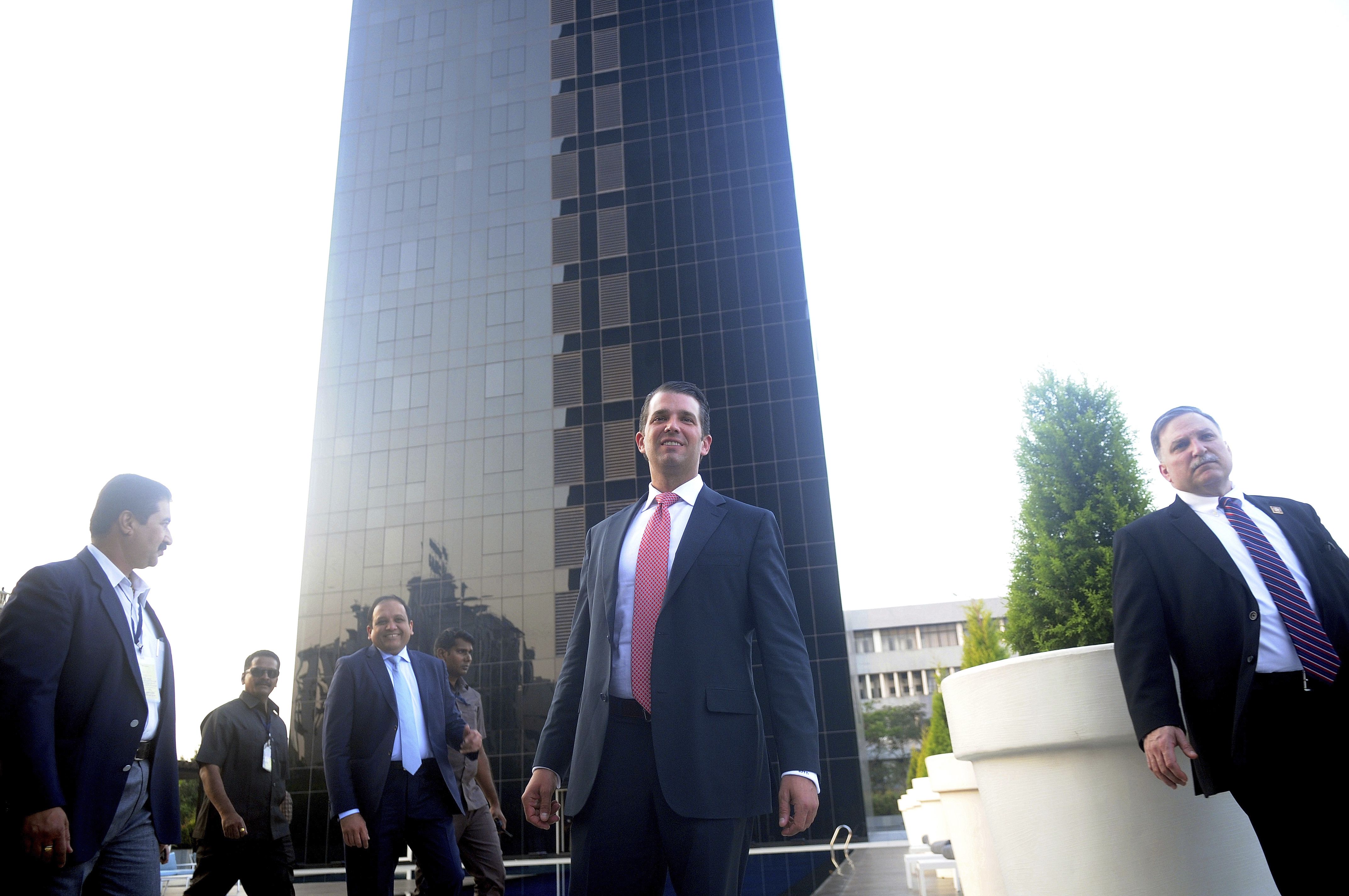There are few countries where the U.S. President’s business interests are so strong, and relations with the U.S. so robust.
Donald Trump Jr. is in India for an extraordinary visit, to play the role of both businessman and diplomat. While mainly helping sell properties tied to the Trump Organization, where he serves as executive vice president, Mr. Trump Jr. is also delivering a policy address on “Reshaping Indo-Pacific ties”.
It’s hard to imagine this type of trip taking place in other countries. U.S. President Donald Trump and some of his progeny are personae non grata in many nations, including top allies such as the U.K. Aside from the issue of unpopularity is one of ethics. Many countries would be reluctant to host the U.S. President’s son for a visit that includes the opportunity for buyers of Trump-branded apartments to pay to meet with Mr. Trump Jr. The fact that India rolled out the red carpet for Mr. Trump Jr. amplifies the uniqueness of U.S.-India relations at this moment in time: There are few, if any, countries in the world where President Trump’s business interests are so strong, and relations with the U.S. so robust.
Business opportunities
Take the commercial side first. The Trump Organization features business dealings in more than two dozen countries, from Trump-branded condos in Seoul to a golf course in Ireland. And yet a Washington Post investigation has concluded that “the Trump Organization has more business entities in India than in any other foreign country.” The study, released in November 2016, contended that Mr. Trump is “involved in at least 16 partnerships or corporations” in India. Mr. Trump Jr. has himself said that India constitutes the largest market outside the U.S. for the type of real estate deals pursued by the Trump Organization.
It’s not just Mr. Trump and his family who value business opportunities in India; members of his cabinet do too. In 2006, Wilbur Ross, who is now Commerce Secretary, established a $300 million fund focussed on India and bought the textile company OMC India Ltd. In 2008, he bought $80 million in convertible bonds issued by the airline SpiceJet. (He subsequently sold it.) Goldman Sachs, the previous employer of Treasury Secretary Steven Mnuchin, boasts a significant presence in India and has provided support to the Indian renewable energy firm ReNew.
Now consider the diplomatic side. Since Mr. Trump took office, Washington’s relationships with traditional foes such as North Korea have worsened, while those that had enjoyed recent periods of relative détente (Pakistan, Iran) have regressed. Most strikingly, relations with some top allies (the U.K., Germany, and Australia) have taken tumbles.
Strengthening ties
By contrast, the U.S.-India relationship has continued to flourish under Mr. Trump. It’s easy to understand why. The two core strategic concerns that have long brought the two together — China’s growing influence and international terrorism — resonate strongly with the Trump administration. Also, arms sales and technology transfers — two main engines of the defence partnership that powers U.S.-India relations — are welcomed by a Trump administration that is unabashedly transactional in its foreign relations. Furthermore, President Trump and Prime Minister Narendra Modi share much in common, from their conservative politics to their fractious relationships with the mass media and strong embraces of social media.
To be sure, there are bones of contention, from the Trump administration’s immigration policies that could deleteriously affect Indian workers in America to Washington’s refusal to pull the plug on its problematic partnership with Pakistan. The two sides also fail to agree on what should constitute their strategic partnership. Washington wants New Delhi to participate in joint operations and other types of alliance behaviour to which India remains allergic. Yet, deep repositories of goodwill and sharp convergences of interests enable the U.S.-India relationship to weather these policy disconnects.
Essentially, Mr. Trump’s expansive business interests in India coupled with rock-solid bilateral relations help explain why New Delhi has pulled out all the stops for Mr. Trump Jr.’s tendentious trip. Could the First Son take his salesman-in-chief/senior diplomat double act elsewhere overseas? Only two possible destinations come to mind: Israel and Saudi Arabia. If he does venture to those locales, however, his achievements this week would be a hard act to follow. Mr. Trump Jr.’s visit to India coincided with that of Canadian Prime Minister Justin Trudeau. The son of the most controversial U.S. President in modern history has not only stolen the spotlight from one of the world’s most beloved and photogenic leaders, he has also enjoyed much warmer treatment.
Michael Kugelman is the deputy director of the Asia Program at the Woodrow Wilson International Centre for Scholars in Washington, DC
http://www.thehindu.com/opinion/op-ed/trumps-india-connect/article22818013.ece

